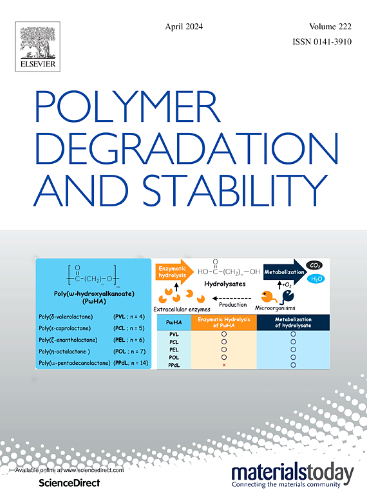Pressure steam ageing of silica filled silicone rubber : Degradation mechanisms
IF 6.3
2区 化学
Q1 POLYMER SCIENCE
引用次数: 0
Abstract
Silica filled silicone rubber compound was hydrothermally aged under a complex condition consisting of a succession of vacuum phases at 80 °C and exposure to pressure steam at 134 °C. The results from various physico-chemical analysis techniques indicate that hydrothermal ageing has significantly affected both the polymer network and the polymer-filler interfaces, allowing the identification of the primary degradation mechanisms. Solvent swelling and solid 29Si CP-MAS NMR analysis evinced that hydrolytic scission reactions predominate in the early stages of ageing and are compensated by recombination reactions for the subsequent cycles.
The volatilization of cyclic oligomers, resulting from the backbiting reaction, led to polymer loss and an associated increase in silica content within the silicone rubber compound, as confirmed by FTIR and TGA analyses. Significant changes occurred at the polymer-filler interfaces during the first few hundred cycles, including the formation of covalent bonds at the silica surface, replacing the physical interactions. These findings were further supported by solid-state 29Si CP-MAS NMR analysis and ammonia-modified swelling experiments.
二氧化硅填充硅橡胶的压力蒸汽老化:降解机理
在80°C连续真空相和134°C压力蒸汽的复杂条件下,对填充二氧化硅的硅橡胶进行了水热老化。各种物理化学分析技术的结果表明,水热老化对聚合物网络和聚合物-填料界面都有显著影响,从而可以确定主要的降解机制。溶剂溶胀和固体29Si CP-MAS NMR分析表明,水解裂解反应在老化的早期阶段占主导地位,并在随后的循环中被重组反应所补偿。FTIR和TGA分析证实,由背咬反应引起的环状低聚物挥发导致聚合物损失,并导致硅橡胶化合物中二氧化硅含量的增加。在前几百个循环中,聚合物-填料界面发生了显著的变化,包括在二氧化硅表面形成共价键,取代了物理相互作用。这些发现得到了固态29Si CP-MAS NMR分析和氨修饰溶胀实验的进一步支持。
本文章由计算机程序翻译,如有差异,请以英文原文为准。
求助全文
约1分钟内获得全文
求助全文
来源期刊

Polymer Degradation and Stability
化学-高分子科学
CiteScore
10.10
自引率
10.20%
发文量
325
审稿时长
23 days
期刊介绍:
Polymer Degradation and Stability deals with the degradation reactions and their control which are a major preoccupation of practitioners of the many and diverse aspects of modern polymer technology.
Deteriorative reactions occur during processing, when polymers are subjected to heat, oxygen and mechanical stress, and during the useful life of the materials when oxygen and sunlight are the most important degradative agencies. In more specialised applications, degradation may be induced by high energy radiation, ozone, atmospheric pollutants, mechanical stress, biological action, hydrolysis and many other influences. The mechanisms of these reactions and stabilisation processes must be understood if the technology and application of polymers are to continue to advance. The reporting of investigations of this kind is therefore a major function of this journal.
However there are also new developments in polymer technology in which degradation processes find positive applications. For example, photodegradable plastics are now available, the recycling of polymeric products will become increasingly important, degradation and combustion studies are involved in the definition of the fire hazards which are associated with polymeric materials and the microelectronics industry is vitally dependent upon polymer degradation in the manufacture of its circuitry. Polymer properties may also be improved by processes like curing and grafting, the chemistry of which can be closely related to that which causes physical deterioration in other circumstances.
 求助内容:
求助内容: 应助结果提醒方式:
应助结果提醒方式:


